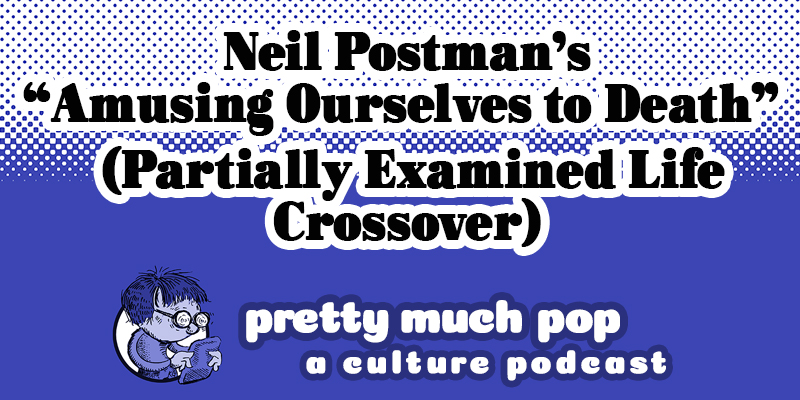Has TV Rotted Our Minds? On Neil Postman’s Amusing Ourselves to Death (A Pretty Much Pop Culture Podcast/Partially Examined Life Philosophy Podcast Crossover)

Marshall McLuhan famously said “The medium is the message,” by which he meant that when we receive information, its effect on us is determined as much by the form of that information as by the actual content.
Neil Postman, in his 1985 book Amusing Ourselves to Death: Public Discourse in the Age of Show Business, ran with this idea, arguing that TV has conditioned us to expect that everything must be entertaining, and that this has had a disastrous effect on news, politics, education, and thinking in general.
In this discussion, your Pretty Much Pop hosts Mark Linsenmayer and Brian Hirt join with the rest of the Partially Examined Life crew: Seth Paskin, Dylan Casey and Wes Alwan.
The result is much more philosophical context than you’d get in a typical Pretty Much Pop discussion. Plato, for example, argued (through the character of Socrates) in the Phaedrus against writing, which he said amounts to off-loading thought to this inert thing, when it should be lively in our minds and our direct conversations. Postman’s book describes the Age of Print as highly congenial toward lengthy, abstract reasoning. High literacy rates, particularly in America, conditioned people to expect that this is how information is to be received, and as such they were, for instance, prepared to listen raptly to the Lincoln-Douglas debates in which the speakers provided lawyerly speeches that might span multiple hours.
Postman, an educational theorist, described television as not just providing a no-context experience whose high level of visual and auditory stimulation beats its spectators into thoughtless passivity, but that its popularity positively infects all the other communication channels available. Of course there is still in-person teaching, but television shortens attention spans such that teachers now feel the need to constantly entertain instead of forcing students to make the effort required to attend carefully to what they have to teach. Of course there are still books, but they are less read, and the competition of television for our time has changed the presentation within books so that they must be as immediately and consistently appealing as television.
McLuhan described television as a “hot” medium due to its high level of stimulation, where a “cool” one like a textbook requires more active participation of the recipient. We discuss how Postman’s critique fares in the Age of the Internet, which interestingly mixes things up, with more interactivity (in that sense cooler) yet even more possibility for sensory distraction (in that perhaps more important sense hotter). To supplement Postman, we also consulted a widely read article from The Atlantic written by Nicholas Carr in 2008 called “Is Google Making Us Stupid.”
For more philosophical touchpoints, see the post for this discussion at partiallyexaminedlife.com.
Hear more Pretty Much Pop at prettymuchpop.com. This episode includes an equally long second part that you can access by supporting Pretty Much Pop at patreon.com/prettymuchpop or by supporting The Partially Examined Life at partiallyexaminedlife.com/support. Listen to a preview of part two.
Pretty Much Pop: A Culture Podcast is the first podcast curated by Open Culture. Browse all Pretty Much Pop posts.
Has TV Rotted Our Minds? On Neil Postman’s Amusing Ourselves to Death (A Pretty Much Pop Culture Podcast/Partially Examined Life Philosophy Podcast Crossover) is a post from: Open Culture. Follow us on Facebook and Twitter, or get our Daily Email. And don't miss our big collections of Free Online Courses, Free Online Movies, Free eBooks, Free Audio Books, Free Foreign Language Lessons, and MOOCs.
from Open Culture https://ift.tt/3sWl77W
via Ilumina
Comments
Post a Comment